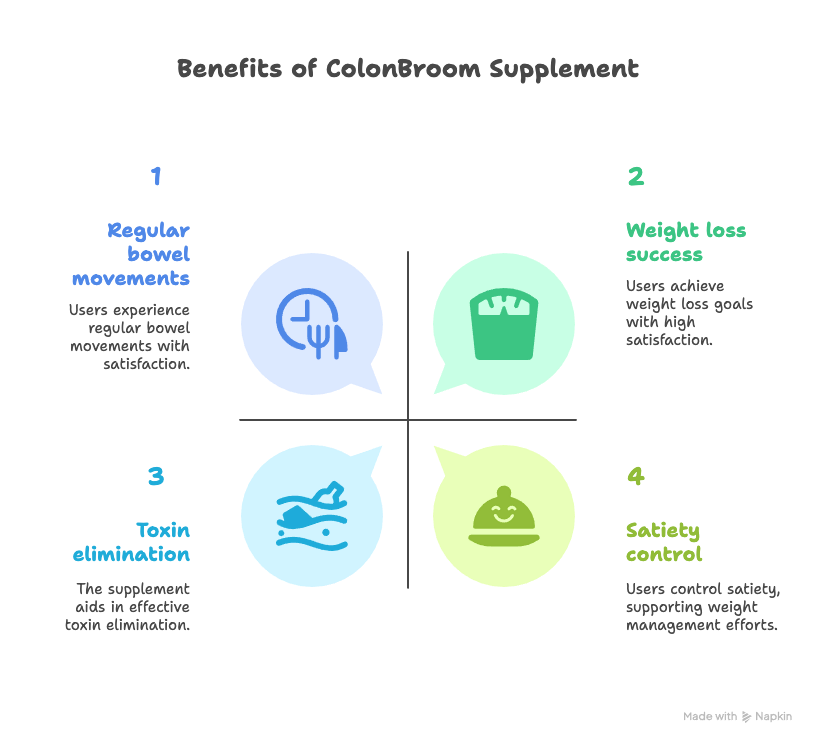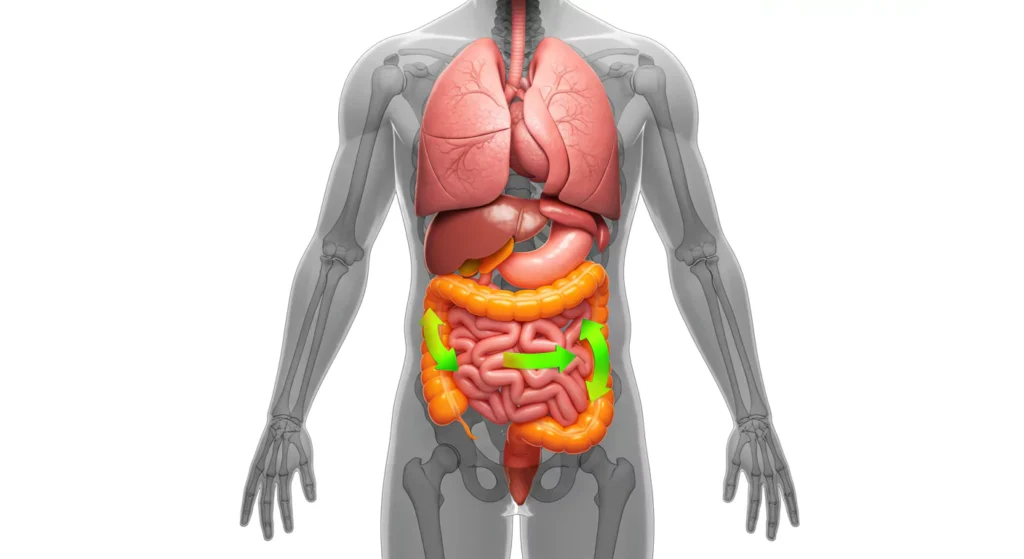Does Constipation Cause Weight Gain? The Complete Guide
If you’ve ever felt heavier during a bout of constipation, you’re not alone. Millions of people worldwide wonder about the connection between digestive issues and weight fluctuations. The short answer? Constipation doesn’t directly cause permanent weight gain, but it can create temporary changes that feel very real.

The Real Connection Between Constipation and Weight
When your digestive system slows down, several things happen that can impact the number on your scale. Understanding these mechanisms helps separate temporary discomfort from actual weight gain.
What Happens During Constipation
Constipation occurs when stool moves slowly through your digestive tract. This creates a domino effect that can temporarily affect your weight:
- Waste accumulation: Unprocessed food and waste build up in your intestines
- Water retention: Your body holds onto extra fluids
- Bloating: Abdominal distension creates a feeling of heaviness
- Metabolic changes: Slower digestion can impact your body’s processing efficiency
The average person might retain 2-5 pounds of unprocessed waste during severe constipation episodes. This isn’t body fat – it’s temporary accumulation that resolves once normal bowel function returns.
How Constipation Affects Your Metabolism
Hormonal Disruptions
Chronic constipation doesn’t just affect your gut – it can disrupt your entire hormonal system:
- Cortisol elevation: Digestive stress triggers your body’s stress response, increasing cortisol levels linked to abdominal fat storage
- Insulin sensitivity: Prolonged digestive issues can impact how your body processes sugars
- Thyroid function: Chronic inflammation may affect thyroid hormones that regulate metabolism
The Gut-Weight Connection
Your digestive system houses trillions of bacteria that influence weight regulation. When constipation disrupts this delicate ecosystem, it can:
- Reduce metabolic efficiency
- Decrease nutrient absorption
- Increase inflammation
- Potentially contribute to weight management challenges
Research from leading medical institutions shows that gut health directly impacts metabolic function, making digestive wellness crucial for maintaining healthy weight.
Physical Symptoms That Feel Like Weight Gain
Immediate Effects (1-3 Days)
During short-term constipation, you might experience:
- Mild bloating
- Feeling of fullness
- Slight abdominal distension
- Minimal actual weight change
Extended Effects (4-7 Days)
As constipation persists:
- Noticeable bloating increases
- Clothes feel tighter
- Scale weight may increase by 2-3 pounds
- Discomfort becomes more pronounced
Chronic Effects (7+ Days)
Long-term constipation can lead to:
- Significant metabolic disruption
- Potential hormonal imbalances
- Increased inflammation
- More substantial temporary weight fluctuations
Why Traditional Solutions Often Fall Short
Many people struggling with constipation and weight concerns find that conventional approaches don’t provide complete relief. Simple remedies like drinking more water or eating an apple might not address the complex relationship between digestive health and metabolism.
The Fiber Factor
Adequate fiber intake is crucial for both digestive health and weight management. Dietary fiber:
- Promotes regular bowel movements
- Increases feelings of fullness
- Supports beneficial gut bacteria
- Helps regulate blood sugar levels
Most adults need 25-35 grams of fiber daily, but the average person consumes only half that amount.
Comprehensive Strategies for Managing Digestive Health
Dietary Interventions
Increase Fiber Gradually
- Whole grains (oats, quinoa, brown rice)
- Fresh fruits (apples, pears, berries)
- Vegetables (broccoli, Brussels sprouts, artichokes)
- Legumes (beans, lentils, chickpeas)
Probiotic-Rich Foods
- Greek yogurt with live cultures
- Kefir
- Sauerkraut
- Kimchi
- Kombucha
Hydration Strategy
- Aim for 8-10 glasses of water daily
- Include water-rich foods like cucumbers and watermelon
- Limit dehydrating beverages like excessive caffeine
Lifestyle Modifications
Physical Activity Regular movement stimulates intestinal muscles and promotes healthy digestion:
- Daily walks
- Yoga poses that massage internal organs
- Core-strengthening exercises
- Consistent workout routine
Stress Management Since stress directly impacts digestion:
- Practice meditation or deep breathing
- Maintain regular sleep schedules
- Consider stress-reduction techniques
- Address underlying anxiety or emotional factors
When to Seek Professional Help
Warning Signs
Consult a healthcare provider if you experience:
- Constipation lasting more than three weeks
- Severe abdominal pain
- Blood in stool
- Unexplained weight loss
- Persistent bloating despite dietary changes
Medical Approaches
Healthcare professionals might recommend:
- Comprehensive digestive evaluation
- Hormonal testing
- Specialized dietary plans
- Targeted supplements or medications
- Colonoscopy if necessary
Modern Solutions for Digestive Wellness
The Role of Specialized Fiber Supplements
Recent advances in digestive health have led to targeted solutions that address multiple aspects of gut wellness. One notable example is ColonBroom, a psyllium husk-based supplement that has gained attention for its comprehensive approach to digestive wellness.
What Makes ColonBroom Different
ColonBroom focuses on psyllium husk as its primary active ingredient – a soluble fiber that absorbs water and becomes a viscous compound. This mechanism provides multiple benefits for people struggling with constipation and weight management concerns:
- Detoxification Support: The high dietary fiber content helps improve the body’s natural detoxification processes by binding to toxins and facilitating their elimination
- Weight Management: By promoting satiety and helping control food intake, the fiber can support healthy weight management goals
- Digestive Regulation: Creates bulk in the intestines while softening stool, addressing both constipation and loose bowel movements
Real-World Results
According to user data from ColonBroom, the supplement has helped address digestive issues for over 500,000 people. The reported outcomes include:
- 95% of users experienced more frequent and regular bowel movements
- 80% recorded weight loss benefits without feeling hungry between meals
- 90% felt noticeably lighter within 12 hours of use
Comprehensive Wellness Approach
What sets modern fiber supplements like ColonBroom apart is their holistic approach. Rather than just providing a fiber powder, the program includes:
- Gut-friendly meal planning guidance
- Exercise programs designed to support digestive health
- Access to educational resources through mobile apps
- Ongoing support for lifestyle modifications
Important Considerations
While psyllium husk-based supplements can be effective, they work best when combined with adequate water intake and gradual introduction to prevent initial bloating. The fiber absorbs significant amounts of water, making proper hydration essential for optimal results.
For people dealing with chronic constipation affecting their weight and overall comfort, targeted fiber supplementation can provide the “reset” needed while building sustainable digestive health habits.
 🚀 Start Your ColonBroom Journey Today – Fast-track your gut health and weight management naturally.
🚀 Start Your ColonBroom Journey Today – Fast-track your gut health and weight management naturally.
The Truth About Quick Fixes
While it’s tempting to look for overnight solutions, sustainable digestive health requires consistent lifestyle changes. However, targeted interventions can provide relatively quick relief while you build long-term healthy habits.
Many people report feeling lighter and more comfortable within 12-24 hours of implementing proper fiber supplementation, though individual results vary based on severity of constipation and overall health status.
Long-Term Weight Management and Digestive Health
Breaking the Cycle
Chronic constipation can create a frustrating cycle:
- Digestive discomfort leads to reduced physical activity
- Decreased movement worsens constipation
- Hormonal disruptions affect metabolism
- Weight management becomes more challenging
Breaking this cycle requires addressing all components simultaneously.
Sustainable Strategies
Create a Routine
- Consistent meal times
- Regular bathroom breaks
- Scheduled physical activity
- Adequate sleep
Monitor Progress
- Track bowel movement frequency
- Note energy levels
- Record weight fluctuations
- Observe overall comfort
Stay Patient Digestive health improvements often take 2-4 weeks to become fully apparent. Consistency is more important than perfection.
Understanding Individual Variations
Factors That Influence Digestive Health
Several factors can impact how constipation affects your weight:
- Age and hormonal status
- Medications you’re taking
- Underlying health conditions
- Stress levels and lifestyle factors
- Genetic predispositions
Personalized Approaches
What works for one person might not work for another. Consider:
- Food sensitivities or allergies
- Preferred types of physical activity
- Work and family schedules
- Budget constraints
- Personal health goals

The Bottom Line on Constipation and Weight
Constipation doesn’t cause permanent weight gain, but it can create temporary fluctuations that feel frustrating and uncomfortable. The key is understanding that digestive health and weight management are interconnected aspects of overall wellness.
Key Takeaways
- Temporary vs. Permanent: Constipation-related weight changes are typically temporary and resolve with improved bowel function
- Holistic Approach: Address diet, lifestyle, stress, and physical activity together
- Patience Required: Sustainable improvements take time and consistency
- Professional Guidance: Persistent issues warrant medical evaluation
- Individual Solutions: What works varies from person to person
Moving Forward
If you’re dealing with constipation and weight concerns, start with basic improvements to diet and lifestyle. Consider targeted fiber supplementation if dietary changes alone aren’t sufficient. Most importantly, be patient with your body as it adjusts to healthier habits.
Remember that over 50 million Americans struggle with constipation, so you’re definitely not alone. With the right approach, you can improve both your digestive health and overall well-being.
The relationship between constipation and weight is complex, but understanding the mechanisms empowers you to make informed decisions about your health. Focus on creating sustainable habits that support your digestive system, and the weight-related benefits will typically follow naturally.
For persistent digestive issues or concerns about unexplained weight changes, always consult with qualified healthcare professionals who can provide personalized guidance based on your individual health needs.



